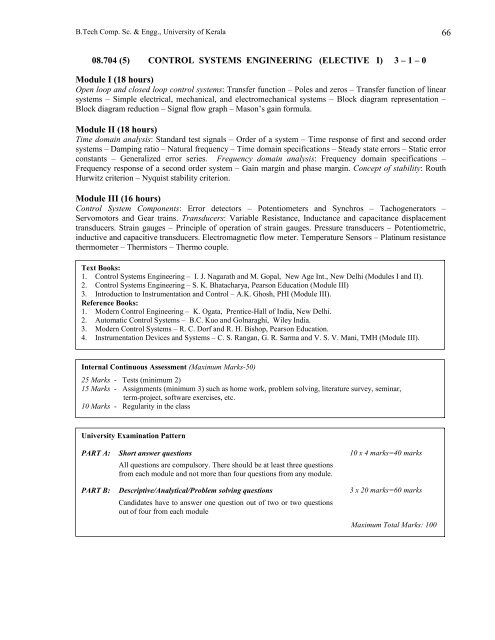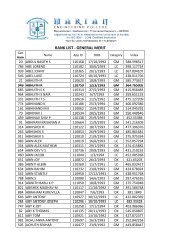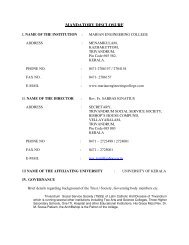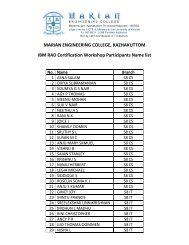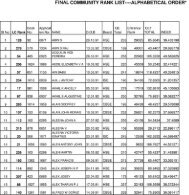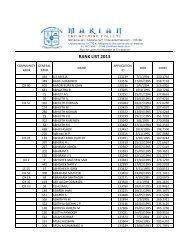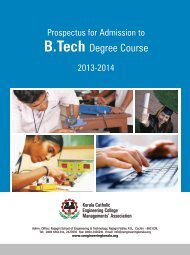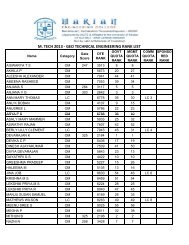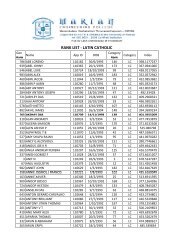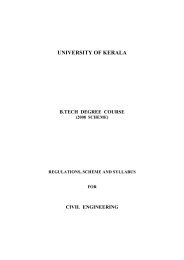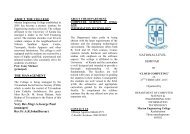UNIVERSITY OF KERALA - Marian Engineering College
UNIVERSITY OF KERALA - Marian Engineering College
UNIVERSITY OF KERALA - Marian Engineering College
Create successful ePaper yourself
Turn your PDF publications into a flip-book with our unique Google optimized e-Paper software.
B.Tech Comp. Sc. & Engg., University of Kerala 66<br />
08.704 (5) CONTROL SYSTEMS ENGINEERING (ELECTIVE I) 3 – 1 – 0<br />
Module I (18 hours)<br />
Open loop and closed loop control systems: Transfer function – Poles and zeros – Transfer function of linear<br />
systems – Simple electrical, mechanical, and electromechanical systems – Block diagram representation –<br />
Block diagram reduction – Signal flow graph – Mason’s gain formula.<br />
Module II (18 hours)<br />
Time domain analysis: Standard test signals – Order of a system – Time response of first and second order<br />
systems – Damping ratio – Natural frequency – Time domain specifications – Steady state errors – Static error<br />
constants – Generalized error series. Frequency domain analysis: Frequency domain specifications –<br />
Frequency response of a second order system – Gain margin and phase margin. Concept of stability: Routh<br />
Hurwitz criterion – Nyquist stability criterion.<br />
Module III (16 hours)<br />
Control System Components: Error detectors – Potentiometers and Synchros – Tachogenerators –<br />
Servomotors and Gear trains. Transducers: Variable Resistance, Inductance and capacitance displacement<br />
transducers. Strain gauges – Principle of operation of strain gauges. Pressure transducers – Potentiometric,<br />
inductive and capacitive transducers. Electromagnetic flow meter. Temperature Sensors – Platinum resistance<br />
thermometer – Thermistors – Thermo couple.<br />
Text Books:<br />
1. Control Systems <strong>Engineering</strong> – I. J. Nagarath and M. Gopal, New Age Int., New Delhi (Modules I and II).<br />
2. Control Systems <strong>Engineering</strong> – S. K. Bhatacharya, Pearson Education (Module III)<br />
3. Introduction to Instrumentation and Control – A.K. Ghosh, PHI (Module III).<br />
Reference Books:<br />
1. Modern Control <strong>Engineering</strong> – K. Ogata, Prentice-Hall of India, New Delhi.<br />
2. Automatic Control Systems – B.C. Kuo and Golnaraghi, Wiley India.<br />
3. Modern Control Systems – R. C. Dorf and R. H. Bishop, Pearson Education.<br />
4. Instrumentation Devices and Systems – C. S. Rangan, G. R. Sarma and V. S. V. Mani, TMH (Module III).<br />
Internal Continuous Assessment (Maximum Marks-50)<br />
25 Marks - Tests (minimum 2)<br />
15 Marks - Assignments (minimum 3) such as home work, problem solving, literature survey, seminar,<br />
term-project, software exercises, etc.<br />
10 Marks - Regularity in the class<br />
University Examination Pattern<br />
PART A: Short answer questions 10 x 4 marks=40 marks<br />
All questions are compulsory. There should be at least three questions<br />
from each module and not more than four questions from any module.<br />
PART B: Descriptive/Analytical/Problem solving questions 3 x 20 marks=60 marks<br />
Candidates have to answer one question out of two or two questions<br />
out of four from each module<br />
Maximum Total Marks: 100


